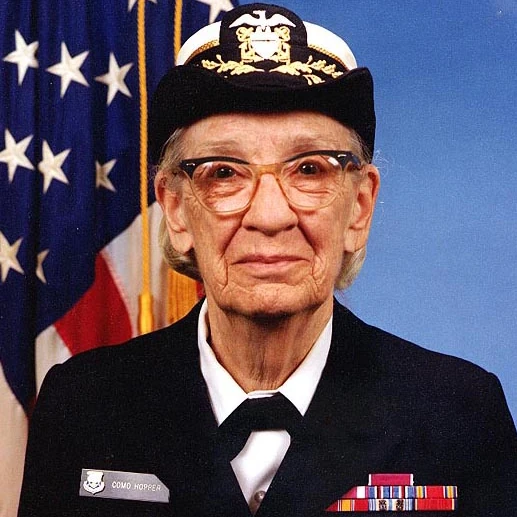Unleash Future Boats:
International Day for Women in Maritime
🌟Celebrating Grace Hopper: A Pioneer in Technology and Maritime Innovation🌟
As we continue to celebrate the achievements of women in maritime, it’s essential to recognize the remarkable contributions of Grace Hopper (1906-1992), a true pioneer whose work has left an indelible mark on both technology and naval operations.
💻 A Trailblazer in Computer Science
Grace Hopper, affectionately known as “Amazing Grace,” was a trailblazer in the world of computer science. She was one of the first programmers of the Harvard Mark I computer and developed the first compiler for a computer programming language [1]. Her work led to the creation of COBOL (Common Business-Oriented Language), which became one of the most widely used programming languages in history [2] thanks to the United States Department of Defense.
Remarkably, COBOL is still very popular today. Depending on the source, there are between 200 and 250 billion lines of COBOL code in production. Many large corporations, 70% in fact, still rely on COBOL for much of their mission-critical work. Government, finance, insurance, automotive, and banking industries are still heavy users. Roughly 43% of banking systems use COBOL, and every time you swipe an ATM card, it executes COBOL code 95% of the time [3]. Hopper’s vision and innovation laid the groundwork for modern computing, earning her the nickname “grandmother of COBOL.”
⚓ Naval Innovations and Leadership
What many might not know is that Grace Hopper’s contributions extended far beyond computer science into the realm of maritime technology. As a rear admiral in the U.S. Navy Reserve, Hopper’s work was crucial in applying computing technology to naval operations. During World War II, she was instrumental in solving complex calculations and logistical challenges faced by the Navy [4].
At the Bureau of Ships Computation Project at Harvard, she developed methods to improve the accuracy of naval gunnery and navigation systems, significantly enhancing the precision and effectiveness of naval operations [5]. Her advocacy for digital computing methods modernized naval operations, making them more efficient and precise [6].
🏅 Legacy and Recognition
Hopper’s legacy is celebrated not only for her groundbreaking work in computer science but also for her role in integrating these innovations into naval technology. She was posthumously awarded the Presidential Medal of Freedom in 2016, recognizing her contributions to both the field of technology and the U.S. Navy [7].
As we honor the women shaping the future of maritime safety and security today, Grace Hopper’s story serves as a powerful reminder of the profound impact that one individual’s dedication and innovation can have across multiple fields. Her work continues to inspire new generations of technologists and maritime professionals, emphasizing the importance of embracing diversity and innovation in all sectors.
Sources:
[1] Harvard Mark I Computer Programming
Plain Text: https://en.wikipedia.org/wiki/Harvard_Mark_I
[2] COBOL Development
Plain Text: https://en.wikipedia.org/wiki/COBOL
[3] Today’s Business Systems Run on COBOL
Plain Text: https://techchannel.com/cobol/todays-business-systems-run-on-cobol/
[4] Grace Hopper Biography – National Women’s History Museum
Plain Text: https://www.womenshistory.org/education-resources/biographies/grace-hopper
[5] Admiral Grace Murray Hopper: When Women Were Computers – The National WWII Museum
Plain Text: https://www.nationalww2museum.org/war/articles/admiral-grace-murray-hopper-when-women-were-computers
[6] Grace Hopper – Biography | Britannica
Plain Text: https://www.britannica.com/biography/Grace-Hopper
[7] Celebrating Presidential Medal of Freedom Winners in Science and Tech
Plain Text: https://obamawhitehouse.archives.gov/blog/2016/11/22/celebrating-presidential-medal-freedom-winners-science-and-tech-garwin-hopper-and
